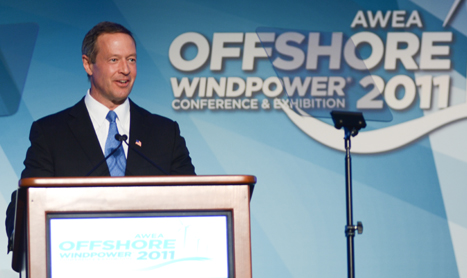
ANNAPOLIS – After failing in last year’s legislative session, Gov. Martin O’Malley is trying again with a new bill that would make offshore wind farming a viable energy source in Maryland.
The bill, which supporters say would create jobs, caps increases in energy bills for Maryland residents at $2 a month.
The Maryland Offshore Wind Energy Act of 2012 would also establish an offshore wind renewable energy credit allowing companies to earn certificates for demonstrating that they are using offshore wind as a certain percentage of their total energy generation.
The new energy credit fits with Maryland’s existing Renewable Portfolio Standard, which requires that renewable energy be used for a certain portion of a company’s sales.
O’Malley’s wind farm initiative met with failure last year mainly because legislators were unwilling to commit to the increased costs that it would mean for Marylanders.
In addition, utility companies would have had to make nearly 20-year commitments to buying offshore wind energy.
O’Malley hopes the revised bill will be met with more support this session in the Maryland General Assembly.
Sen. Paul Pinsky, D-Prince George’s, was a vocal advocate for offshore wind farming last session and continues to support the governor’s plan.
“No one in the United States has actually started constructing them offshore in the ocean,” said Pinsky, referring to a proposed location for turbines about 10 to 12 miles off the coast of Ocean City.
Pinsky said this year’s legislation has a better chance because there is less liability for ratepayers.
However, some legislators are still not convinced that offshore wind would be a good investment.
“They have a weak case that the jobs are going to come to Maryland,” said Sen. E.J. Pipkin, R-Caroline.
Pipkin said the billions of dollars the state is hoping to invest in offshore wind farming is too steep of a price to pay, especially when there are alternative sources of fuel, such as coal.
However, like Pinsky, Delegate Tom Hucker, D-Montgomery, believes offshore wind farming is definitely an industry that Maryland should explore.
Hucker has been working closely with the governor’s staff and meeting with stakeholders to address last year’s concerns.
This year’s legislation will be modeled on current successful Maryland energy policy, like that connected with solar power, said Hucker. In this sense, the legislation will feel familiar, and there will be stronger protection for consumers and ratepayers than previously proposed.
“The price of wind will be totally steady and predictable,” said Hucker, comparing it favorably to prices for nuclear, coal or electrical power.
Hucker said there has been a lot more positive reaction this year and a lot more grassroots activity.
With other countries already making big strides in wind farming, he believes that it’s time for Maryland to try to “create an entire industry.”


You must be logged in to post a comment.